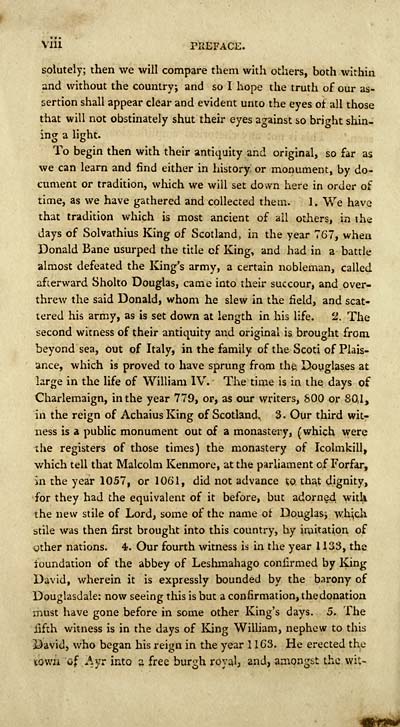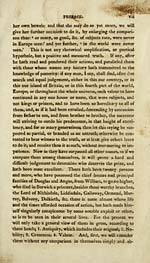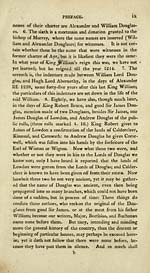History of the house and race of Douglas and Angus
(12) Page viii
Download files
Complete book:
Individual page:
Thumbnail gallery: Grid view | List view

V"l PREFACE.
solutely; then we will compare them with others, both within
and without the country; and so I hope the truth of our as-
sertion shall appear clear and evident unto the eyes or all those
that will not obstinately shut their eyes against so bright shin-
ing a light.
To begin then with their antiquity and original, so far as
we can learn and find either in history or monument, by do-
cument or tradition, which we will set down here in order of
time, as we have gathered and collected them. 1. We have
that tradition which is most ancient of all others, in the
days of Solvathius King of Scotland, in the year 767, when
Donald Bane usurped the title of King, and had in a battle
almost defeated the King's army, a certain nobleman, called
afterward Sholto Douglas, came into their succour, and over-
threw the said Donald, whom he slew in the field, and scat-
tered his army, as is set down at length in his life. 2. The
second witness of their antiquity and original is brought from
beyond sea, out of Italy, in the family of the Scoti of Plais-
ance, which is proved to have sprung from the Douglases at
large in the life of William IV. The time is in the days of
Charlemaign, in the year 779, or, as our writers, 800 or 80,1,
in the reign of AchaiusKing of Scotland, 3. Our third wit-
ness is a public monument out of a monastery, (which were
the registers of those times) the monastery of Icolmkill,
which tell that Malcolm Kenmore, at the parliament of Forfar,
in the year 1057, or 1061, did not advance to. that dignity,
for they had the equivalent of it before, but adorned with,
the new stile of Lord, some of the name or Douglas; which
stile was then first brought into this country, hy imitation of
other nations. 4. Our fourth witness is in the year 1 133, the
foundation of the abbey of Leshmahago confirmed by King
David, wherein it is expressly bounded by the barony of
Douglasdale: now seeing this is but a confirmation, thedonation
must have gone before in some other King's days. 5. The
fifth witness is in the days of King William, nephew to this
jDavid, who began his reign in the year 1 163. He erected the
town of Ayr into a free burgh royal, and, amongst the wit-
4B"Ti^^
solutely; then we will compare them with others, both within
and without the country; and so I hope the truth of our as-
sertion shall appear clear and evident unto the eyes or all those
that will not obstinately shut their eyes against so bright shin-
ing a light.
To begin then with their antiquity and original, so far as
we can learn and find either in history or monument, by do-
cument or tradition, which we will set down here in order of
time, as we have gathered and collected them. 1. We have
that tradition which is most ancient of all others, in the
days of Solvathius King of Scotland, in the year 767, when
Donald Bane usurped the title of King, and had in a battle
almost defeated the King's army, a certain nobleman, called
afterward Sholto Douglas, came into their succour, and over-
threw the said Donald, whom he slew in the field, and scat-
tered his army, as is set down at length in his life. 2. The
second witness of their antiquity and original is brought from
beyond sea, out of Italy, in the family of the Scoti of Plais-
ance, which is proved to have sprung from the Douglases at
large in the life of William IV. The time is in the days of
Charlemaign, in the year 779, or, as our writers, 800 or 80,1,
in the reign of AchaiusKing of Scotland, 3. Our third wit-
ness is a public monument out of a monastery, (which were
the registers of those times) the monastery of Icolmkill,
which tell that Malcolm Kenmore, at the parliament of Forfar,
in the year 1057, or 1061, did not advance to. that dignity,
for they had the equivalent of it before, but adorned with,
the new stile of Lord, some of the name or Douglas; which
stile was then first brought into this country, hy imitation of
other nations. 4. Our fourth witness is in the year 1 133, the
foundation of the abbey of Leshmahago confirmed by King
David, wherein it is expressly bounded by the barony of
Douglasdale: now seeing this is but a confirmation, thedonation
must have gone before in some other King's days. 5. The
fifth witness is in the days of King William, nephew to this
jDavid, who began his reign in the year 1 163. He erected the
town of Ayr into a free burgh royal, and, amongst the wit-
4B"Ti^^
Set display mode to:
![]() Universal Viewer |
Universal Viewer | ![]() Mirador |
Large image | Transcription
Mirador |
Large image | Transcription
Images and transcriptions on this page, including medium image downloads, may be used under the Creative Commons Attribution 4.0 International Licence unless otherwise stated. ![]()
| Histories of Scottish families > History of the house and race of Douglas and Angus > (12) Page viii |
|---|
| Permanent URL | https://digital.nls.uk/94873758 |
|---|
| Description | A selection of almost 400 printed items relating to the history of Scottish families, mostly dating from the 19th and early 20th centuries. Includes memoirs, genealogies and clan histories, with a few produced by emigrant families. The earliest family history goes back to AD 916. |
|---|

